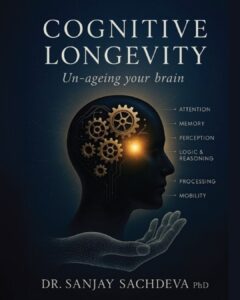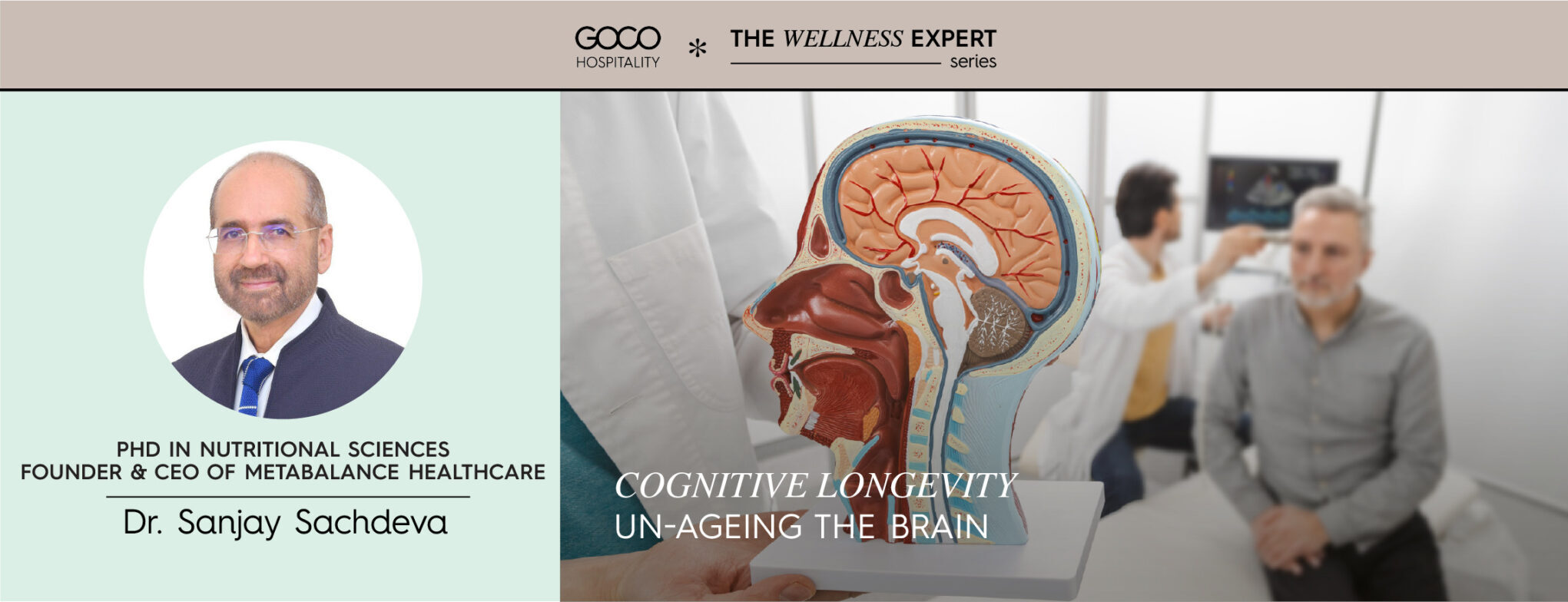COGNITIVE LONGEVITY
UN-AGEING YOUR BRAIN
By Dr. Sanjay Sachdeva
Dr. Sanjay Sachdeva, PhD in Nutritional Sciences and Founder & CEO of Metabalance Healthcare, a comprehensive Functional & Bio-regulatory Medicine Centre facility in Delhi. Based in India, he leads the country’s only mobile functional medicine clinic and consults for leading wellness resorts and clinics across India, the Middle East, and Southeast Asia. A pioneer in lifestyle and metabolic disorder treatment, he has helped over 3,000 patients and supported over 6 million globally through Doctors Beyond Medicine. With 14 national awards and a strong vision for wellness and longevity, Dr. Sachdeva is shaping the future of preventive healthcare through innovative platforms, corporate programs, and global speaking engagements. Dr. Sanjay is also the author of “Age is Just a Number – Strategies for Ageless Living”.

Dr. Sanjay Sachdeva
In this Wellness Expert Series article, Dr. Sachdeva shares with us insights from his latest research and forthcoming book, Cognitive Longevity: Un-Ageing the Brain. He explores the evolving science behind cognitive longevity, what it means, why it matters, and how we can preserve and enhance brain health as we age. Dr. Sachdeva unpacks the complexity of the concept, outlining the key factors that influence cognitive vitality, from lifestyle and environment to mindset and epigenetics. Drawing on current scientific understanding, he also highlights the profound connection between cognitive longevity and our overall well-being as it impacts not only on physical and mental health, but also on the resilience of individuals and the strength of societies.
The first thing that struck me when I turned 60 was an image (shown below) I received in a WhatsApp message which became the inspiration and catalyst to start researching on this fascinating subject of ‘Cognitive Longevity: Un-Ageing your Brain’.
 Quote from San Banducci
Quote from San Banducci
During my research, I found myself captivated by the exploration of maintaining and enhancing our mental faculties over time leaves us with a profound understanding of the human mind’s resilience and adaptability. I am currently writing my next book on this subject, which delves into the dynamic nature of cognitive health, offering insights into how lifestyle choices, mental exercises, and technological advancements can contribute to preserving and enhancing brain function well into our later years.
The narrative weaves together the latest scientific research with practical strategies, emphasizing the importance of proactive engagement in mental activities, balanced nutrition, and regular physical exercise, added to a host of other epigenetic factors. These elements not only support long-term cognitive vitality but also enrich our overall quality of life. The discussions on neuroplasticity and the ever-growing field of cognitive neuroscience have illuminated how our brains are not static entities but are instead capable of remarkable growth and change. This field of Neuroplasticity indeed opened up an immense era of possible learnings and how learning also enhanced my own ability to develop new neural pathways and circuits. Sometimes, I surprise myself when speaking on the topic; because of the constant reading and learning of a completely new subject, I ended up absorbing a lot of new principles, which led to new connections and new synapses suddenly popping up in my mind when I start to think cognitively and what impacts the brain. The brain picks up data from what I have read in some article or book and connects that data with something completely new and I start to write or speak about that connected field. Almost like machine learning in action.
I must clarify, I am not a neuroscientist, nor do I hold a medical MBBS degree. However, as part of my research on this new subject, I have delved deeply into brain ageing and how to un-age your brain as this decline is impacting so many of my friends and family members and people of my generation. My biggest fear is losing my memory and forgetting the names and faces of those I love most. This article is dedicated to all my friends and all of those who wish to keep their brain fog away and want to keep a sharp brain even in their 90s and 100s.
Readers are encouraged to view their cognitive health as an ongoing process, one that requires attention and care much like physical health. The strategies and methodologies that must be developed will serve as a guide to cultivating a robust mental landscape, offering tools to combat the challenges that come with aging.
Reflecting on the insights shared, it becomes evident that the journey of cognitive longevity is both personal and universal. The commitment to nurturing our mental faculties is a testament to our desire for a fulfilling life, enriched with clarity, creativity, and connection. As we navigate the complexities of modern living, the knowledge gained here empowers us to take charge of our cognitive destiny, ensuring that “age becomes merely a number”, not a barrier to our intellectual and emotional well-being.
I wrote my first book called “Age is Just a Number” which covers the broad subject of ageing and included a small chapter on brain function and ageing. However, I feel that without addressing cognitive ageing, the story would be incomplete. After all, what’s the point of having a healthy body without without an agile, active, learning, curious brain, without an “ever youthful brain”?
 Dr. Sachdeva’s new book, Cognitive Longevity, Un-ageing your brain
Dr. Sachdeva’s new book, Cognitive Longevity, Un-ageing your brain
Defining Cognitive Longevity
Cognitive longevity refers to the preservation and enhancement of cognitive functions as individuals age, encompassing a broad spectrum of mental abilities such as memory, attention, problem-solving, and language skills. Unlike the general notion of life expectancy, which focuses on the duration of life, cognitive longevity emphasizes the quality of cognitive health over the lifespan. This concept is increasingly gaining attention in scientific research due to the growing aging population and the desire to maintain mental acuity well into the later years of life.
The biological underpinnings of cognitive longevity are complex and multifaceted, involving genetic, environmental, and lifestyle factors. At the molecular level, cognitive longevity is influenced by the integrity of neural networks, synaptic plasticity, and neurogenesis. These processes are regulated by a host of genetic factors, including those that govern neurotrophic factors, neurotransmitter function, and the inflammatory response. Furthermore, genetic predispositions can modulate an individual’s resilience to neurodegenerative diseases, which are significant threats to cognitive longevity.
Environmental factors also play a crucial role in cognitive longevity. Exposure to enriched environments, characterized by intellectual stimulation, social engagement, and physical activity, has been shown to enhance cognitive reserve. Cognitive reserve refers to the brain’s ability to improvise and find alternative ways of completing tasks, thus providing a buffer against age-related cognitive decline. Education and lifelong learning are particularly potent contributors to cognitive reserve, as they promote neural plasticity and the formation of new synaptic connections.
Lifestyle choices, such as diet and exercise, significantly impact cognitive longevity. Nutritional interventions that include antioxidants, omega-3 fatty acids, and vitamins have been associated with improved cognitive function and reduced risk of neurodegenerative diseases. Regular physical activity is another critical factor, as it enhances cerebral blood flow, promotes neurogenesis, and reduces the risk of cognitive impairment. Moreover, maintaining a healthy sleep pattern is essential for cognitive longevity, as sleep supports memory consolidation and the clearance of neurotoxic waste products from the brain.
Psychosocial factors, including stress management and emotional well-being, are also vital for sustaining cognitive health. Chronic stress has been linked to structural and functional changes in the brain, particularly in areas involved in memory and executive function. Effective stress management techniques, such as mindfulness and meditation, can mitigate these adverse effects and promote cognitive resilience.
The interplay between these biological, environmental, and lifestyle factors highlights the complexity of achieving cognitive longevity. It requires a holistic approach that integrates various domains of life to support optimal cognitive functioning. As research progresses, there is an increasing focus on personalized strategies that take into account individual differences in genetics, life experiences, and personal preferences. By understanding and harnessing these factors, it is possible to extend the period of cognitive vitality, thereby enhancing the overall quality of life for aging individuals. This emerging field holds promise for developing interventions that not only delay cognitive decline but also promote cognitive growth and adaptation throughout the lifespan.
Today, the historical perspectives on cognitive longevity inform a multidisciplinary approach that integrates insights from psychology, neuroscience, gerontology, and public health. This holistic view acknowledges that cognitive longevity is influenced by a complex interplay of genetic, environmental, and lifestyle factors. Understanding this rich historical context not only highlights the evolution of scientific thought but also underscores the ongoing quest to unlock the secrets of sustaining mental acuity throughout the human lifespan.
Current Scientific Understanding
The exploration of cognitive longevity has gained momentum in recent years, driven by a convergence of advances in neuroscience, psychology, and gerontology. At the core of this inquiry is the understanding of how cognitive functions can be maintained or even enhanced as individuals age. Current scientific insights suggest that cognitive longevity is influenced by a complex interplay of genetic, environmental, and lifestyle factors. This subchapter delves into the key findings from contemporary research that illuminate our understanding of cognitive longevity.
One of the primary contributors to cognitive longevity is genetic predisposition. Studies involving twins and families have demonstrated that genetics play a crucial role in determining cognitive health in later years. Specific genes, such as the APOE gene, have been linked to cognitive decline and the risk of developing neurodegenerative diseases like Alzheimer’s. However, genetic factors alone do not dictate cognitive outcomes. The field of epigenetics has revealed that gene expression can be significantly influenced by environmental factors, suggesting that lifestyle choices can modify genetic predispositions.
Environmental factors, including education and occupational complexity, have been shown to have profound effects on cognitive longevity. Higher levels of education are associated with a greater cognitive reserve, which is thought to provide a buffer against age-related cognitive decline. Engaging in mentally stimulating activities, whether through formal education or intellectually demanding work, appears to fortify cognitive functions, potentially delaying the onset of cognitive impairments.
Physical health is another critical determinant of cognitive longevity. Cardiovascular health, in particular, has a well-documented relationship with cognitive function. Conditions such as hypertension, diabetes, and obesity are associated with increased risk of cognitive decline. Regular physical exercise has been shown to improve cardiovascular health and, consequently, support cognitive performance. Exercise is believed to enhance neuroplasticity, the brain’s ability to reorganize itself by forming new neural connections, which is a key mechanism in maintaining cognitive function.
I was motivated by my friend, guide and mentor to do my APOE4 test. Thankfully, I did not have an active APOE4 gene and that meant lower risk of Alzheimer and lower risk of cardiovascular disease including heart attack and strokes.
It also means better lipid profile and has potential benefits for brain health.
However, my deep research on epigenetics has taught me that reality is not genetic destiny while not having the APOE4 gene reduces your risk of certain diseases it is essential to maintain a healthy lifestyle including diet, nutrition, exercise and stress management.
Diet also plays a pivotal role in cognitive longevity. Nutritional studies have identified specific diets, like the Mediterranean diet, as having protective effects against cognitive decline. Such diets are rich in antioxidants, healthy fats, and anti-inflammatory compounds, which are thought to combat oxidative stress and inflammation, both implicated in cognitive aging.
Social engagement and mental well-being are additional factors that significantly contribute to cognitive longevity. Social interactions are believed to stimulate cognitive processes, while also providing emotional support and reducing stress. Mental health, particularly the management of depression and anxiety, is crucial, as these conditions have been linked to accelerated cognitive decline.
Recent advancements in neuroimaging and biomarker development have furthered our understanding of the biological underpinnings of cognitive longevity. These technologies allow for the early detection of changes in brain structure and function, potentially enabling interventions that can mitigate or reverse cognitive decline.
In conclusion, the current scientific understanding of cognitive longevity underscores the multifaceted nature of maintaining cognitive health with aging. While genetics lay the foundation, lifestyle factors such as education, physical health, diet, social engagement, and mental well-being play indispensable roles in shaping cognitive trajectories. Continued interdisciplinary research is essential to unravel the complexities of cognitive longevity and to develop effective strategies for enhancing cognitive health across the lifespan.
Importance of Cognitive Longevity
The concept of cognitive longevity has garnered significant attention within the scientific community due to its profound implications for individual well-being and societal health. As populations across the globe age, maintaining cognitive function becomes increasingly crucial, not only for enhancing the quality of life of older adults but also for alleviating the economic and social burdens associated with cognitive decline.
Cognitive longevity refers to the preservation of cognitive faculties such as memory, attention, and problem-solving skills, over the lifespan. It encompasses both the delay of cognitive decline and the enhancement of cognitive function through various interventions. The importance of cognitive longevity is underscored by its impact on everyday functioning and independence. Cognitive impairments can lead to difficulties in performing daily tasks, which in turn can result in a loss of autonomy and increased dependence on caregivers and healthcare systems.
Scientific studies have demonstrated that maintaining cognitive health is closely linked to physical health. Chronic conditions such as cardiovascular disease, diabetes, and obesity have been identified as risk factors for cognitive decline. Conversely, engaging in regular physical activity, adhering to a balanced diet, and managing stress have been shown to bolster cognitive resilience. This interconnection suggests that strategies aimed at promoting overall health can concurrently support cognitive longevity.
Moreover, cognitive longevity has significant implications for mental health. Cognitive decline is often accompanied by mood disorders, including depression and anxiety, which can exacerbate cognitive impairments. Therefore, interventions that support cognitive health can also enhance emotional well-being, creating a positive feedback loop that benefits both cognitive and mental health.
The economic ramifications of cognitive longevity are also noteworthy. Cognitive disorders such as dementia place a substantial financial burden on healthcare systems due to the costs associated with long-term care, medical treatments, and lost productivity. By extending the period during which individuals can live independently and remain engaged in the workforce, cognitive longevity can help mitigate these economic challenges. This potential for cost savings and improved quality of life underscores the importance of investing in research and interventions that promote cognitive health.
From a societal perspective, cognitive longevity contributes to the sustainability of communities. Older adults who maintain their cognitive abilities can continue to contribute their knowledge, skills, and experience to society, whether through employment, volunteer work, or mentorship. This not only enriches the lives of older individuals but also fosters intergenerational exchange and cohesion.
Research into the mechanisms underlying cognitive longevity has identified several promising avenues for intervention. These include cognitive training exercises, lifestyle modifications, pharmacological treatments, and technological innovations. Understanding the factors that influence cognitive resilience and decline is critical for developing effective strategies to support cognitive health across the lifespan.
In summary, cognitive longevity is a multifaceted concept with far-reaching implications for individuals and society. Its importance is reflected in the potential to enhance quality of life, reduce healthcare costs, and sustain societal contributions from older adults. As such, advancing our understanding and implementation of strategies to promote cognitive longevity remains a priority in the field of cognitive health research.
As we age, our average life span has gone up from 60 years to 73 years. This would have a massive economic and health impact on our society and the burden it would impose on our healthcare systems as by 2030 we will have 30% populations above 65. Hence it is imperative that we keep the cognitive health of our country in top conditions.
In my opinion, the biggest risk of ageing or rather the biggest fear is the fear of forgetting the faces and name of my family and my loved ones.
No one wants to set into that state.
The key lies in preserving our mental faculties even at 100 years old. I once read that the most relevant age ranges between 60 and 80. By this stage, most of us have achieved a certain level of success, with a settled career and family responsibility largely being taken care of. Hence, now is the time for us to prepare to share our wisdom and knowledge with the society as an ageing population, in order to not become a burden to our family and society. Instead, we can choose to remain engaged, purposeful and encourage people to grow. That is why the importance of cognitive ageing takes relevance.

